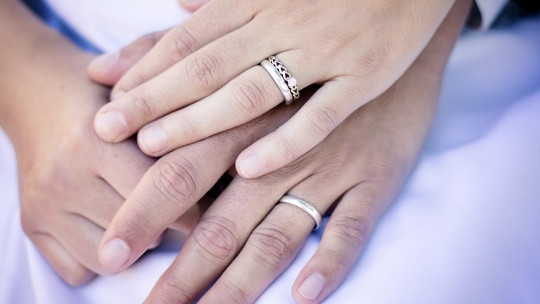In a restaurant, Valeria has just finished dinner with her partner. He heads to the bathroom. After a while, Valeria begins to realize that Fabián is taking longer than usual. She imagines that a restaurant is not a good place to be deceived, so she knows that she should not be guided by that distrust that she has been carrying since the end of her last relationship, but her boyfriend has left the phone in her coat. Good. That means she’s not cheating on her. nowbut you could make sure that it hasn’t done so recently.
He picks up the phone, scrolls through the latest chats and finds nothing; but he soon suspends the review because out of the corner of her eye she sees Fabián approaching the table. Far from bringing him calm, after checking the phone he becomes even more worried. As they are leaving, Fabián politely greets the restaurant waitress, and Valeria, who had been crafting a very complex narrative in her mind without even realizing how her boyfriend could be cheating on her, explodes at him. And it’s not the first time something like this has happened.
Perhaps many people are familiar with this type of situation in which distrust and jealousy take control, whether from the couple’s side or from the first person. It is also true that jealousy does not necessarily emerge in the couple, but this emotion can appear when faced with the possibility of losing a loved person, whatever it may be. In any case, many people experience high levels of suffering due to what began as distrust and, finally, mutated into jealousy, that is, uncontrollable jealousy that ends up diminishing their interpersonal ties. In this article we will see What is the reason why people experience jealousy, what function does it serve, and what can we do about it to avoid falling into jealousy?
The function of jealousy
Jealousy is an emotion and, like all emotions, it is normal, universal and serves the purpose of providing us with information about ourselves, our circumstances or the world around us. People experience jealousy when we want to exclusively possess a person with whom we have an emotional bond, such as a partner, a father or a sister, but we consider that there is a possibility of losing them.
Returning to the example of the situation in the restaurant, although we can all empathize with Valeria’s pain – for not being able to control her jealousy – and with Fabián’s – as his partner’s jealousy affects him in a negative way – , we do not intend to demonize jealousy as an emotion. At an evolutionary level, jealousy has been useful to guarantee pair bonding, reproduction and offspring in pursuit of the survival of the species. But today, contrary to what one might believe, they can also be useful. People, when engaging in emotional ties, ideally establish a series of guidelines that determine what we expect from the other while maintaining a relationship, what behaviors will be accepted by both parties and which will not. Therefore, Jealousy could serve the purpose of informing a person that perhaps the couple’s agreements are not being fulfilled, or that it is necessary to review them together
However, most commonly, people who suffer from jealousy are not “at risk” of being cheated on, nor are their partners always on the verge of violating their agreements. In other words, we all feel jealousy – as it is part of our human nature – and this can be adaptive on some occasions, but what distinguishes people with jealousy from those who do not is that the former tend to organize their behavior with the in order to make sure and reassure themselves that they are not being deceived, without conceiving that these behaviors could have negative consequences in the long term.
What distinguishes jealousy from distrust?
If we go to a specific level of analysis, the reality is that it is impossible to be absolutely certain that our partners are not cheating on us. As we mentioned, we could even argue that distrust, to some extent, could be useful and we do not have to fight against it.
Sometimes it can provide us with valuable information about the environment. People who do not exhibit jealousy may distrust others or experience jealousy, but they nevertheless have the necessary skills to decide how they want to act towards them. This means, in many cases, tolerate the uncertainty inherent to mistrust when this is not consistent with the facts of reality. For its part, on the other side of the line, that of jealousy, a person could be guided by the need to confirm that the other is being faithful and ask, insistently, “where have you been?” or check your mobile phone.
How does jealousy affect a person’s life?
There is no univocal cause capable of determining why some people have a conflictive relationship with their jealousy while others do not. What we do know is that the former tend to have lower levels of self-esteem, which could be both a cause of jealousy but also a consequence of being guided by it repeatedly over time. We can also argue that people who behave maladaptively when they feel jealous are, ultimately, the most affected. It is exhausting trying to get a seal that determines that you are not being deceived even when the other assures his fidelity explicitly and with total honesty.
People cannot turn off our thoughts at our mercy as if it were a remote control. When a person recognizes that they are on the side of jealousy and is willing to heal, it is likely that, at least initially, they will continue to experience jealousy and thoughts that tempt them to carry out behaviors that are harmful to themselves and their partner, such as Valeria did in the restaurant. We say that these behaviors are harmful because the person, although in the short term he obtains relief (he is assured that he is not being deceived), in the long term it has worse consequences (he finds a new situation in which to behave in a way that he would not like). , ends up exploding in front of his partner).
Fortunately, there are psychological treatments capable of helping people overcome jealousy and face a better relationship with their jealousy, so if you are suffering from this problem, consulting with a mental health professional could be very useful. .









